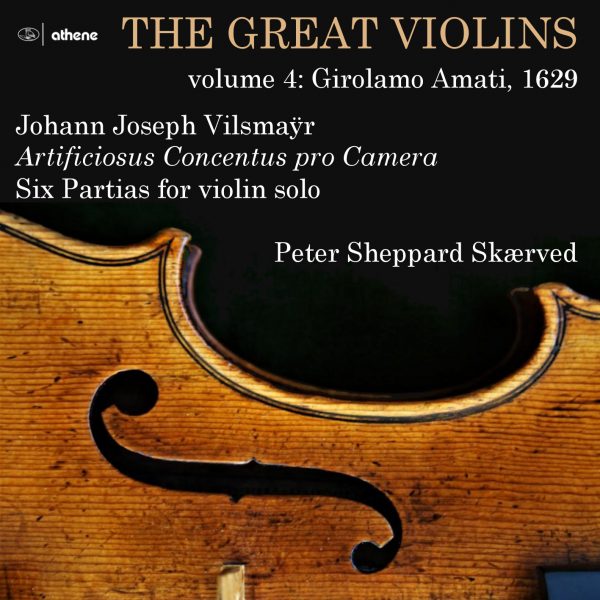Fanfare
This is Volume 4 of Peter Sheppard Skærved’s series of recordings titled The Great Violins. On this disc he gives us six unaccompanied partias by the Austrian Baroque composer Johann Joseph Vilsmaÿr (1663-1722), a pupil of Heinrich Biber. A partia is a suite of dances, usually for a solo instrument. In the manner of his teacher, Vilsmaÿr uses scordatura tuning, tuning the violin in ways different from the norm. In his informative notes, Skærved explains the retuning in great detail.
Skærved plays a Girolamo Amati violin from 1629, certainly the kind of instrument Vilsmaÿr would have had in mind when he wrote these works, and both the instrument and the playing are beautiful. The problem for me is the music itself. Skærved informs us that suites like this “were designed to be played/heard as a balanced and narrative sets, each illustrating certain qualities and affects. The equivalent, away from music, would be gatherings of paintings, such as Peter Paul Rubens’ 1621-5 ‘L’Apotheose d’Henri IV et la proclamation de la regence de la reine, le 14 mai 1610.’ I have chosen this because, whilst it is a giant 24-painting cycle, it not only is designed to be appreciated all at once, but it also depicts the events (real and fanciful) of one day in 1610.” Skærved extends the comparison to the dramatic evolution of these six partias, explaining how the changes in tuning help reflect this evolution.
The problem, at least for me, is that despite the evolution being described, the music lacks drama. All six pages of detailed notes did not help me keep my mind on it. I kept thinking that Vilsmaÿr’s music is a vivid demonstration of the genius of Johann Sebastian Bach. Vilsmaÿr was a more than competent, well-schooled musician, and he understood how to write for the violin. But to write great music takes more than competence and schooling. It takes inspiration, that elusive quality we call genius. Inspiration is missing here, at least to my ears. To be sure, there is some pleasure to be had, but I found too much repetition in the music and a lack of thematic distinction.
Scholars and students of the history of the violin may well be satisfied with this release. Neither Skærved nor Athene Recordings could have presented this any better than they have.
@divineartrecordingsgroup
A First Inversion Company
Registered Office:
176-178 Pontefract Road, Cudworth, Barnsley S72 8BE
+44 1226 596703
Fort Worth, TX 76110
+1.682.233.4978












